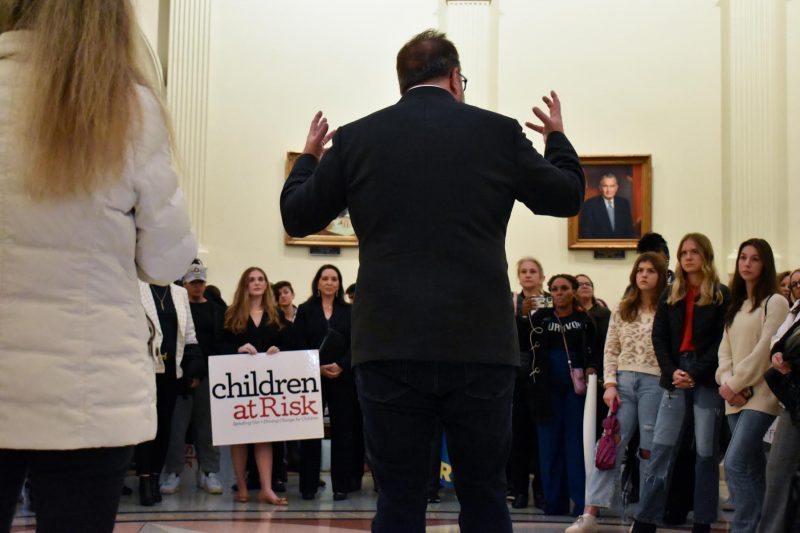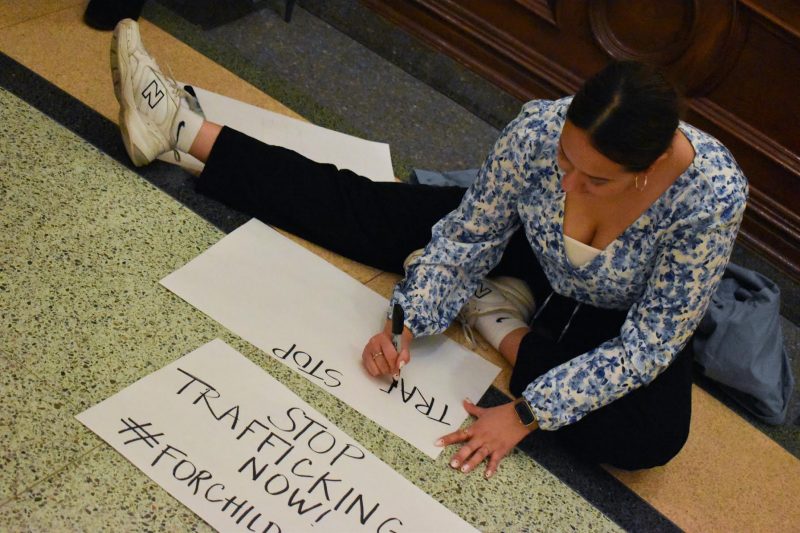Advocates Press for Anti-Trafficking Legislation at Capitol Rally
By Ana Paola Davila Chalita
Reporting Texas

Bob Sanborn, president of Children at Risk, encourages the crowd to chant “stop trafficking now” on Jan. 24, 2023, in the Texas Capitol rotunda. Ana Paola Davila Chalita/Reporting Texas
Chanting “stop trafficking now” and holding signs, dozens of people gathered inside the state Capitol on Jan. 24 for an anti-human trafficking advocacy day.
Chantel Yarboug, 33, traveled from Houston to attend. Yarboug said she started being trafficked 13, and she only escaped in 2022 when police rescued her.
“They isolated me, made me do things against my will,” Yarbough said, “I went from one to another, they just passed me around.”
Yarbough said she is finding her way to recovery — she became addicted to drugs while being trafficked — at the Santa Maria Hostel in Houston, an addiction recovery program that houses trafficking survivors, and she wants to be an advocate for other trafficking victims.
State legislators addressed the group in the Capitol rotunda, including Sen. Tan Parker, R-Flower Mound, and Rep. Ann Johnson, D-Houston.
Texas is “the worst state in this country for human trafficking,” Parker told the crowd. “It is disgusting, it is horrific, and it must stop.”
In reality, Texas only trails California in the number of people trafficked, according to a 2021 report from the National Human Trafficking Hotline. Of 51,073 calls to the National Trafficking Hotline in 2021, 3,534 were from Texas.
The Texas-based child advocacy organization Upbring defines human trafficking as “when a person is exploited for labor, services or commercial sex in exchange for money, drugs or anything else of value. A key feature of human trafficking is that it happens through fraud, force or coercion.”
Because human trafficking is often so well hidden, statistics probably don’t reveal the true extent of the problem, said Lindsey Speed, the executive director of Traffick911, a non-profit organization that helps sex trafficking victims. “We only know what’s been uncovered, but there’s a lot that hasn’t been uncovered,” she said.

Becky Quintanilla writes a sign in the State Capitol on Jan. 24, 2023. Quintanilla works with Children at Risk to help human trafficking victims. Ana Paola Davila Chalita/Reporting Texas
As rain poured outside the Capitol, many of the attendees said they want legislators to prioritize several bills, including House Bill 350, by Rep. Senfronia Thompson, D-Houston, which targets the use of so-called white-label ATMs that can be used to hide financial transaction associated with human trafficking; House Bill 444, also by Thompson, which would allow local governments to collect fees in court actions brought against illicit massage parlors; and House Bill 279, by Rep. Jacey Jetton, R-Richmond, which would allow prosecutors to try traffickers who have victimized “disabled individuals.”
Advocates say so-called white-label ATMs have become a tool of traffickers. Most ATMs are owned by banks and are well regulated. White-label ATMs, which can be bought on the internet, are not regulated and are sometimes used in financial crimes and by human trafficking operations.
“They are used to withdraw cash, and then that cash is used to purchase sex,” said Caroline Roberts, a senior staff attorney at Children at Risk, a child-advocacy organization.
Better oversight of white-label ATMS could lead police to traffickers and disrupt trafficking operations, Roberts added.
Allowing local governments to collect fees in legal cases brought against illicit massage businesses, as HB 444 would do, is another part of a multifaceted approach to ending trafficking.
There are hundreds of illicit massage businesses that act as fronts for sexual exploitation in Texas, and tens of thousands of Texas children attend public schools within 1,000 feet of a suspected illegal massage business, according to a report from Children at Risk.
“(HB 444) would bring civil penalties up to $10,000 per violation,” Roberts said. “It would motivate local government attorneys to bring these actions.”
According to state law, using force, fraud or coercion to lure an adult into forced labor or sex work is a felony. Exploiting children for commercial sex, even without force, fraud or coercion, is also a felony. HB 279 seeks to treat “disabled individuals” the same as children when it comes to trafficking.
Kimberly Proler volunteers with Houston20, an advocacy group which helps nonprofits provide services to trafficking victims. Proler, who attended the rally with her high school-aged daughter and a group of her friends who also volunteer with Houston20, told Reporting Texas that “stiffer penalties for the people that solicit people with disabilities,” would help protect the vulnerable group.
Traffickers see people with disabilities as an “easy target,” Proler added.
Several advocates in the Capitol rotunda said that requiring ride-sharing, such as Uber and Lyft, to provide training to their drivers so they know when they are transporting a victim is another top priority.
Thompson said at the press conference following the rally, that she is looking forward to filing legislation that would train ride share drivers on how to recognize trafficking victims.
For Yarbough, showing up is important because it gets legislators’ attention.
“Our voices are not heard,” Yarbough said, “so it’s amazing to be here today.”